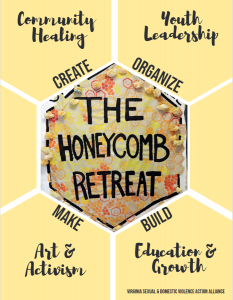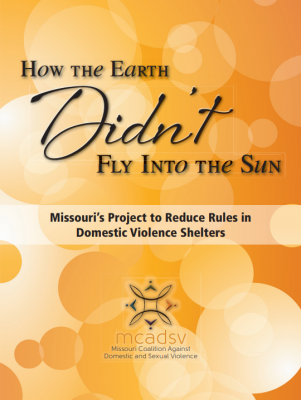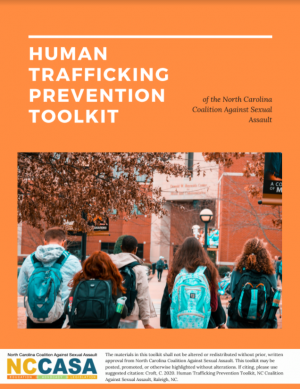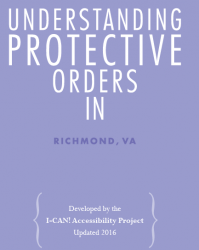Resources Library: Publications/Reports
Start a Search:
Homicide: An Analysis of Homicide in Virginia Among Those 50 Years or Older, 1999 – 2007
A brief article examining intimate partner homicide in people age 50 or older which considers the following questions: (1)what were the characteristics of persons 50 years of age or older who were killed as a result of intimate partner discord or violence and (2) what were the circumstances surrounding intimate partner homicide events in which decedents were persons 50 years of age or older?
Published by: Virginia Department of Health, Office of the Chief Medical Examiner. June, 2010. 14 pages.
Honeycomb Reflection and Share Out

In July 2019 the Action Alliance organized and hosted a week-long retreat for young advocates, activists, and artists ages 17-23 called the Honeycomb Retreat. Our participants (fellows) went to workshops on systemic and interpersonal violence, consensual communities, zines for visionary futures, and using herbalism practices to heal from trauma. They also went to art sessions during which they worked with local artists-in-residence to create art in response to the things they were learning in their workshop and their own personal experiences. The week ended with a visioning session where fellows had the opportunity to talk about their skills they bring to our movement, the barriers that impact their full participation, the resources and support they need from adult allies, and what they are excited to do next!
This is an informational and reflective zine that describes some of our goals, frameworks, and outcomes—as well as a general overview of what happened at the retreat and who was there. Please do not hesitate to reach out and connect on these topics!
How the Earth Didn’t Fly Into the Sun: Missouri’s Project to Reduce Rules in Domestic Violence Shelters

This guide is part of a shared goal between NRCDV, state coalitions, and individual programs to find a better way to welcome women and other domestic violence victims -- many of whom had every aspect of life controlled by their partners -- into shelter where they could experience autonomy despite the constraints of a communal living environment. The concept and conflict of having rules in shelter has been repeatedly recycled and re-silenced throughout the movement to end violence against women. This manual tells how Missouri's project became a living laboratory to answer the question, "What would happen if there weren't rules?"
This first-hand account of Missouri's project to reduce rules in domestic violence shelters offers practical tips for other state Coalitions, programs, and individual advocates interested in this approach. It includes the history of the project, examples of common challenges and successes, and logistics of implementation. Surveys, suggestions and the philosophy the Missouri programs followed are also in this ÒHow-toÓ guide, funded by the National Resource Center on Domestic Violence (NRCDV).
* Access the recording of a lively BlogTalkRadio show where the Missouri Coalition Against Domestic and Sexual Violence (MCADSV) discusses this guide - How the Earth Didn't Fly Into the Sun: Missouri's Project to Reduce Rules in Domestic Violence Shelters [23:08]
Human Trafficking Prevention Toolkit

Human trafficking prevention has at times been framed primarily as a criminal justice priority or been siloed from other forms of violence prevention. As experts in sexual violence prevention, NCCASA recognizes sex trafficking as a form of sexual violence and the connection of sexual violence to all forms of human trafficking. NCCASA is pleased to present the Human Trafficking Prevention Toolkit. In this toolkit, you'll find the Human Trafficking Prevention Overview, an overview of what human trafficking is and the public health approach to violence prevention, an exploration of the historical context that informs current frameworks and gaps, tips for effective upstream prevention, and strategies for incorporating a harm reduction lens into your human trafficking prevention work, as well as critical considerations in selecting a prevention strategy.
I-CAN! Understanding Protective Orders in Richmond, Virginia

The I-CAN! Understanding Protective Orders in Richmond, Virginia Booklet describes what a protective order is, the types of protective orders, the process of obtaining a protective order in Richmond, Virginia, tips about going to court, what to do after you receive a protective order, and various resources.
Attached is (1) the English version of the booklet, (2) a large print English version of the booklet, and (3) a Spanish version of the booklet.

